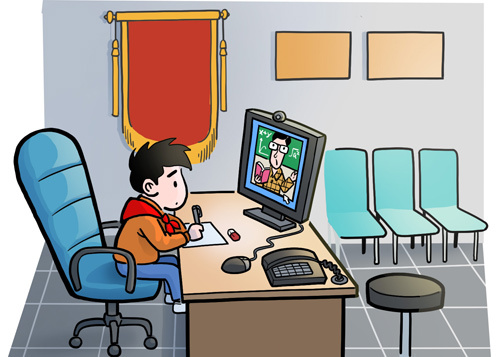
LUO JIE/CHINA DAILY
The villagers' committee of Dongjiang village in Qingyuan city, Guangdong province, has turned its office into an interim distance learning classroom, which 10 children from poverty-stricken families in the village can take turns to use to attend online courses prepared by their schools.
The move is heartwarming and praiseworthy, as it shows the better-off villagers' care for their needy neighbors, as the latter who survive on less than 10.27 yuan ($1.5) per person a day, might not be able to afford the sudden extra expenses involved in buying a smartphone or computer with which to access the internet.
Following the instructions of the Ministry of Education, all schools in the country have postponed the start of the new semester, and most began offering online education by last week, in a bid to prevent the novel coronavirus from entering schools.
But the digital divide, a consequence of the income gap, undoubtedly deserves people's attention, as more and more public services are now being provided with the assistance of digital means. Online education, a makeshift response to the epidemic, is just a case in point.
Late last month a girl from a low-income family in Dengzhou, Henan province, tried to commit suicide by swallowing the sedative drugs that her mother uses to treat depression, because she feared she might lose the fierce competition in her grade 9 class as she could not manage to use the only smartphone in the family long enough to attend her online courses because her elder sister and younger brother also needed it.
The girl received emergency treatment and thankfully survived. But the incident has exposed the situation for those who are on the disadvantaged side of the digital gap.
To solve the difficulties of poor students' online lessons, we must not only rely on poverty alleviation, but also need more attention and diligence from all parties involved.
As such, all grassroots units-including sub-district offices, social organizations and neighborhood committees-that are central to the "last mile" of good governance, particularly in assisting those who are on the lowest rungs of the social ladder, should follow the example of Dongjiang and take care of the impoverished population in a more thoughtful and pre-emptive manner.


